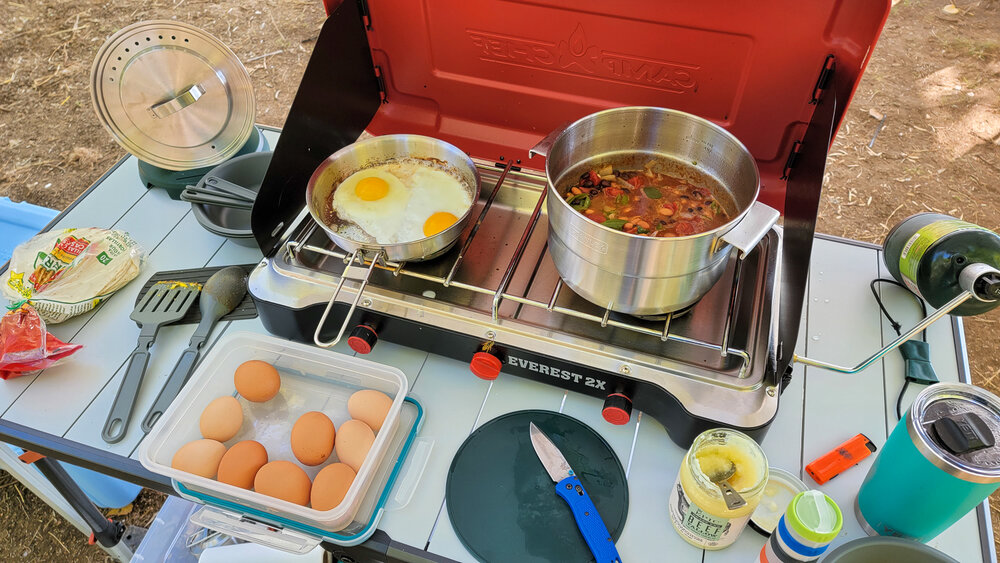
We’re avid cooks both at home and on our adventures, and it’s taken decades to dial in this list of our favorite camping recipes. We love these meals because they have a great balance of being convenient to make outdoors and gourmet enough to satisfy our taste for luxury while on vacation.
Related: If you’re looking for ultralight food ideas for backpacking, check out our 20 Great Backpacking Meal Recipes and Food Dehydration Tips page and other food guides.
You may also be interested in our other camp kitchen-related gear guides:

Steak & potatoes make a delicious & memorable meal when cooked in the Lodge Dutch Oven Combo Cooker over a fire
No Measurements?
You may notice that we don’t list many specific measurements in the following recipes. We prefer to leave this open to interpretation so you can take these ideas and make them your own. Scale the amounts up or down to suit your taste and group size. With a bit of experience, you’ll probably find that it’s more enjoyable to cook intuitively in camp and that measuring isn’t always necessary. Add salt and spices slowly, taste often, and build up until you can eyeball amounts fearlessly.
Steak & Potatoes

Using the Lodge Dutch Oven Combo Cooker to sear a ribeye steak over the fire - potatoes are wrapped in foil on the side
Steak and potatoes make a hearty and luxurious camping meal. Our favorite way to cook steak is over a bed of coals in a cast iron skillet. That said, a frying pan on a camping stove is more convenient and offers more control if the timing or setting isn’t right for a campfire.
Shopping list:
Steak (1 per 1-2 people - we prefer ribeye or T-bone)
Potatoes (a small 1.5 lb. bag is plenty for 2 people - petite red or gold)
Butter
Herbs (rosemary, thyme, etc.)
Garlic
Salt and pepper
Oil
Aluminum foil
Horseradish/steak sauce/au jus

We like the Lodge Dutch Oven Combo Cooker because it’s deep & the lid can be used as a frying pan
To cook steak and potatoes in camp: Ribeye or T-bone steak are best if you can find them on sale. One large cut of meat will feed 1-2 people and fits well is a frying pan. Get the steak out of your cooler twenty minutes to an hour before you plan to cook it. Salt it generously on both sides and let it come to room temperature to tenderize. Meanwhile, wrap the rinsed baby red potatoes in 2 layers of foil with butter, salt, and herbs (rosemary, garlic, and thyme). Place the foil package of potatoes near the edge of the fire to roast, turning occasionally with a hot mitt. Alternatively, you boil the whole potatoes or cube them and fry them in a pan.
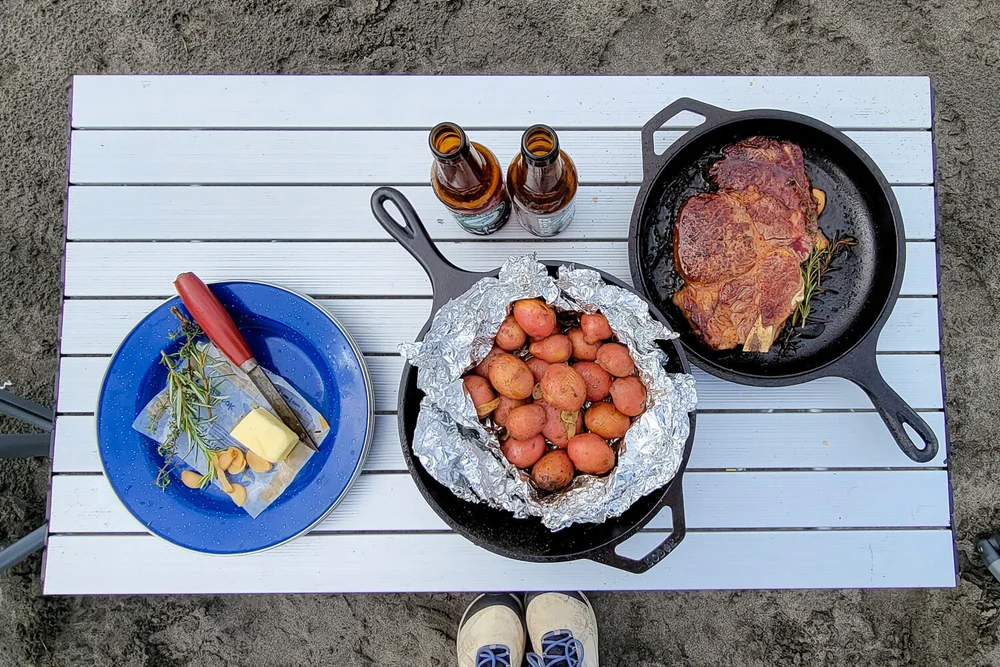
A camping table makes cooking outside a lot easier & more enjoyable
To cook steak perfectly - Melt oil in a skillet over high heat, then sear the meat (about 4 minutes per side for a 1-inch thick steak) until brown on the outside and deliciously caramelized. Cook according to your taste - we prefer our steak medium-rare. Test the doneness by touch or use a thermometer for more precision. For extra gourmet flavor, melt butter in the side of the pan and sizzle sliced garlic and herbs before spooning it over the steak. Remove the pan from the heat and let the meat rest for 5-10 minutes. It will continue to cook and firm up, so pull it a touch early. Resist the urge to cut into it to check the internal color until the juices have had a chance to reabsorb.
Slice the steak and add more butter or salt to taste. Serve with rustic potatoes and sauce if desired - horseradish, steak sauce, or au jus are excellent.
Tacos
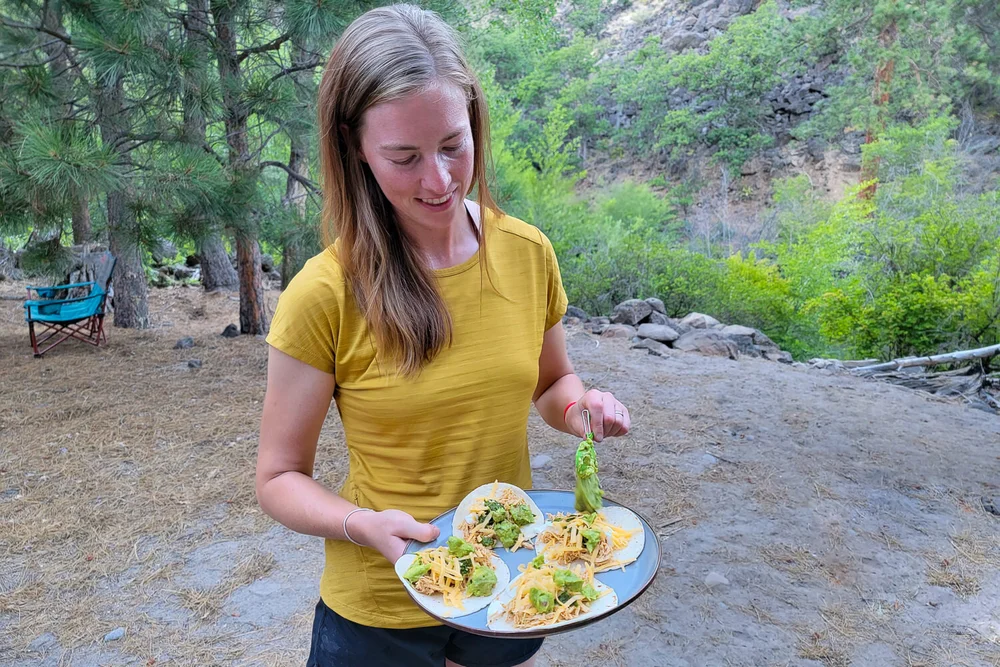
Tacos are easy to make, affordable & you can customize them to any diet or taste
Tacos are a guaranteed crowd pleaser. They’re simple to make in the field, affordable no matter how big your group size, and they’re easy to adapt to suit all tastes and diets. With a little variation, you can make tacos at hit for breakfast, lunch, or dinner.
Shopping list:
Tortillas (small or street taco size)
Meat (ground beef/turkey, pork roast, chicken breast, or fish)
Seasonings (salt, pepper, cumin, garlic, oregano, chili powder)
Beans (canned refried or whole black/pinto)
Toppings (cheese, sour cream, cabbage, radishes, avocado, jicama, corn, or red onion)
Sauce (taco sauce, hot sauce, salsa, Sriracha mayo, or lime juice)

Making chicken tacos on the GSI OUTDOORS SELKIRK 540 STOVE
To make tacos in camp: Brown or warm up meat, sauté veggies (onions, peppers, etc.), and warm beans on your stove. Warm tortillas on a hot skillet for a few seconds per side, then plate 2-3 tacos per person (taco holders make this a million times easier). Add as many toppings as you’d like. Some of our favorite taco toppings are salsa for spice, cabbage for crunch, avocado for decadence, and lime juice or queso fresco for punch. To make things even easier in camp, you could cut toppings at home and pre-cook the meat (an Instant Pot is awesome for this).
French Toast

French toast with fresh berries is easy, decadent & makes great leftovers
French toast is great for satisfying the sweet tooth in your group, but it also packs a punch of protein to fuel your day of adventure. It’s fun and easy to make in camp, and if you’re not a big fan of sweets, you can also make it savory with pesto, ham, cream cheese, etc.
Shopping list:
Eggs (about 1 per 2 slices of bread)
Milk/milk alternative (about 1/4 cup per egg)
Vanilla extract
Cinnamon
Sliced bread
Butter
Maple syrup or berries, sugar, and cornstarch for topping

Use a hard egg holder or pre-crack eggs into a jar at home to make transporting them easier
To make French toast in camp: Crack eggs into a shallow dish or deep plate (to make transport easier, pre-crack eggs into a jar at home and pack it in the cooler). Add milk, vanilla extract, and cinnamon, and whisk with a fork to combine. Dredge both sides of bread slices through the egg mixture before frying them in butter. Top with maple syrup or make your own topping with fresh berries, sugar, and cornstarch. We like to make extra French toast and berry syrup so we can use it for Monte Cristo sandwiches the following day.
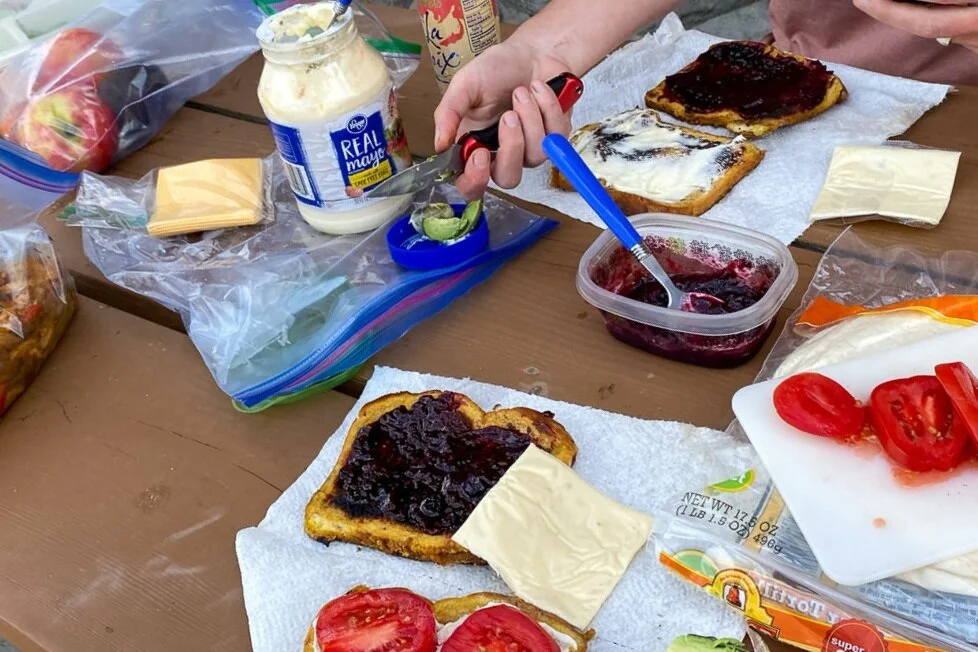
Making our own version of Monte Cristo sandwiches with leftover French toast
To make Monte Cristo Sandwiches with leftovers:
Bread & Eggs (or leftover French toast)
Meat (sliced ham, turkey, or both)
Cheese (Swiss or Provolone)
Mayonnaise
Jam (or leftover berry syrup)
Powdered sugar (optional)
Additional veggies or condiments (tomatoes, avocado, mustard)
Ziploc bags
Beans & Eggs

Making beans & eggs for breakfast in the Stanley Adventure Base Camp Cookset 4
Beans and eggs are incredibly easy to make, hearty, and an excellent vehicle for delicious toppings. Eat like a cowboy for sustained energy into the afternoon.
Shopping list:
Canned beans (pinto, black, or kidney, etc.)
Veggies (onions, garlic, peppers, tomatoes)
Spices (chili powder, cumin, salt, pepper)
Oil or fat (tallow, vegetable oil, or bacon grease)
Eggs (1-2 per person)
Chips
Salsa/hot sauce
Tortilla chips (for chilaquiles)
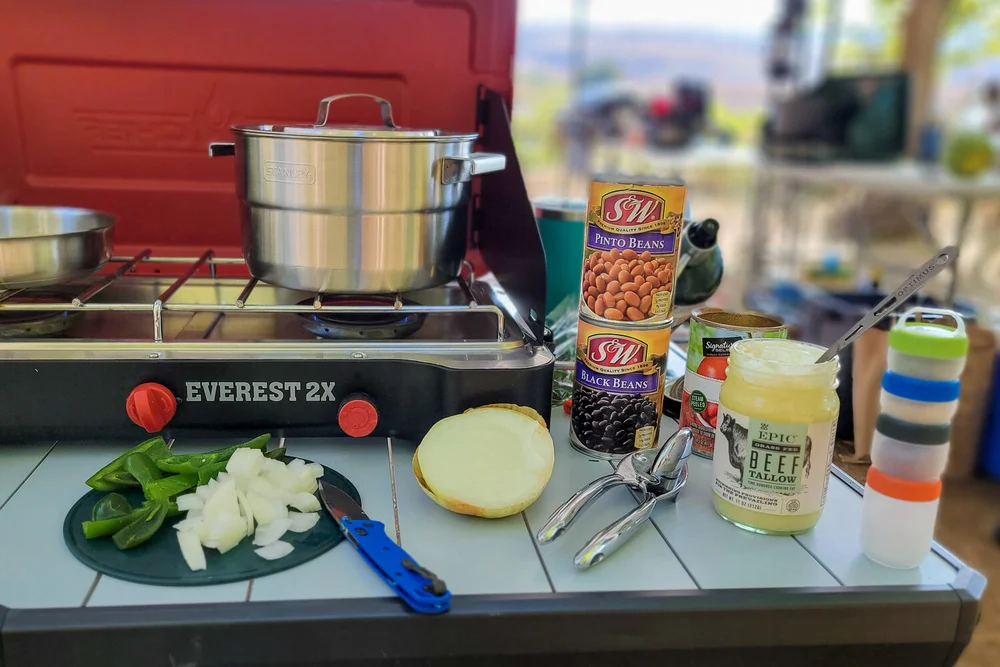
The humangear STAX Container Set makes it really easy to bring spices & condiments to camp & keep them organized
To make beans and eggs in camp: Simmer canned beans on the stove (don’t drain) with a generous spoonful of oil or fat of your choice. We like using tallow for flavor and long-lasting sustenance. Mash the beans (or leave them whole) and add whatever extras you want for flavor and texture - we add things like onion, garlic, hot peppers, garlic, and cumin. A plain can of refried beans also works well if you prefer to keep it simple. Divide the beans into bowls and cook an egg or two to top each serving (we like to steam-baste our eggs so we don’t have to flip them). You can also make this recipe into chilaquiles, a delicious Mexican breakfast, by stirring in tortilla chips and adding salsa.
Low-Country Boil

pour your low boil on to a table covered in butcher paper so everyone can dig in for a memoriable experience
A low boil makes for a truly memorable camping experience. It’s a fun and festive way to feed a big group, and once you have everything prepped, (could do at home or at the campsite), all you have to do is drop things into a pot of boiling water in succession. Make a note to remember the order/timing and get your phone timer ready!
Shopping list:
(makes enough for about 8-10 people)
Old Bay seasoning (about 1/2 cup - or 1 entire container)
Beer (optional - one tall cheap lager is fine)
Small-medium size potatoes (about 4 lbs. - red or gold are best)
Sweet onions (2 or 3)
Andouille sausage (about 2 lbs.)
Corn (8 ears)
Shrimp (about 4 lbs. - raw, peeled, tail-on is easiest for camping)
Butter
Cocktail sauce
Lemons
French bread

To make things easier, you can prep low-boil ingredients at home & simply add them to the pot in the campsite
To make a low-boil in camp: Boil a stock pot of water, then add Old Bay seasoning and a can of beer (optional). Once it boils again, add whole red potatoes and boil for 5 minutes. Then add chopped onions and 1-inch sections of smoked sausage and cook for 15 min. Next, add ears of corn broken in half and cook for 10 min. Finally add shrimp and cook for 3 min.
Once you can easily pierce a potato with a fork, pour everything carefully through a strainer. Save the liquid in a gallon bag in the cooler to make amazing chowder later. We like to pour the food onto a table covered in several layers of butcher paper so everyone can gather around and dig in, but you could also dish it onto plates from the pot. Sprinkle everything with more seasoning and serve with sliced French bread, melted butter, cocktail sauce, and lemon wedges. If there are any leftovers, sort it into bags and save it for omelets the next morning with tangy Cilantro Lime Crema sauce.

An omelet made from low-boil leftovers with Cilantro Lime Crema sauce
To make omelets with leftovers:
Eggs
cheese (we like Swiss)
Red peppers
Avocado
Sour cream (last 6 ingredients for sauce)
Mayo
Cilantro
Lime
Garlic
Salt
Bruschetta

Bruschetta is a fresh, easy, & satisfying appetizer or snack
If you’ll be spending much time in camp, a fresh and healthy snack like bruschetta is a great appetizer or midday energy boost your group can hover around. It will really spice up the downtime between meals and keep energy high between activities. Bruschetta tastes really gourmet, but it’s actually quick and easy to make.
Shopping list:
(be free with amounts)
Roma tomatoes
Fresh basil
Minced garlic
Extra virgin olive oil
Balsamic vinegar
Salt (kosher)
Pepper
Parmesan cheese (fresh grated is best)
French bread, baguette, or pita chips
To make bruschetta in camp: Dice fresh Roma tomatoes and add them to a large pot or bowl. Chop fresh basil, or if you want to get fancy - stack, roll, and slice the leaves into ribbons. Add the basil to the tomatoes along with minced garlic, extra virgin olive oil, balsamic vinegar, salt, pepper, and grated parmesan cheese. Stir to combine the mixture and let it rest a bit. Meanwhile, thinly slice a baguette or French bread and toast them lightly on each side in a frying pad. Spoon tomatoes over toasts or hover around the bowl and dip like we do!
Steel-Cut Oats with Peaches

Steel-cut oats with peaches & cream in the GSI Outdoor Stainless Troop Cookset
If you’re thinking oatmeal is textureless muck, you haven’t tried this recipe yet. This wholesome and delicious breakfast will leave you nourished and longing for more. Steel-cut oats look similar to rice and are processed differently than other forms of oatmeal. This gives them a great chewy, non-mushy texture. We look forward to the tradition of making steel-cut oats with peaches on camping trips in cool weather. It’s affordable, it warms the belly, and it’s incredibly easy to make for a group.
Shopping list:
Steel-cut oats (1 cup makes 2 hearty servings)
Water or milk (3 cups per 1 cup oats)
Salt (roughly 1/2 tsp. per 1 cup oats - kosher is best)
Frozen peaches (medium-large bag for a group)
Cinnamon
Brown sugar
Heavy whipping cream or milk alternative
To make steel-cut oats with peaches in camp: Add oats, liquid (water or milk), and salt to a pan. Bring to a boil, and reduce the heat to a simmer for 20 minutes, stirring occasionally. Cook your oats for 5-10 minutes more, depending on how chewy you like them. In 30 minutes they’ll be soft, thick, and creamy. The oats will continue to thicken as they rest, so it’s ok if there’s some residual liquid when you take them off the heat.
Simultaneously, sauté frozen peaches in a skillet with cinnamon, brown sugar, and a very small amount of water. If you’re feeling adventurous, add a few sprigs of fresh thyme to the mix while the concoction melts and simmers.
To serve, divide oats into bowls and top with peaches and a generous dash of cold cream.

A table like tHE ALPS MOUNTAINEERING DINING TABLE is GREAT FOR GROUP MEALS & GAMES
More Camping Food Ideas
We love food and we have a ton more ideas where these came from. Here are a few more simple camping meals we make frequently:
Yogurt with granola and fresh berries
Blueberry pancakes and bacon
Savory oats with eggs (use broth instead of water to cook oats & add veggies)
Sandwich bar with chips
Charcuterie plate with salami, cheese, nuts, fruit, pickled things, jam, crackers, etc.
Stir-fry with meat, veggies, and soy sauce
Homemade chili with chips and fresh toppings (cilantro, sour cream, etc.)
Beans and rice with green peppers, smoked sausage, and hotsauce
Pasta (add veggies, cheese, meats, and sauces)
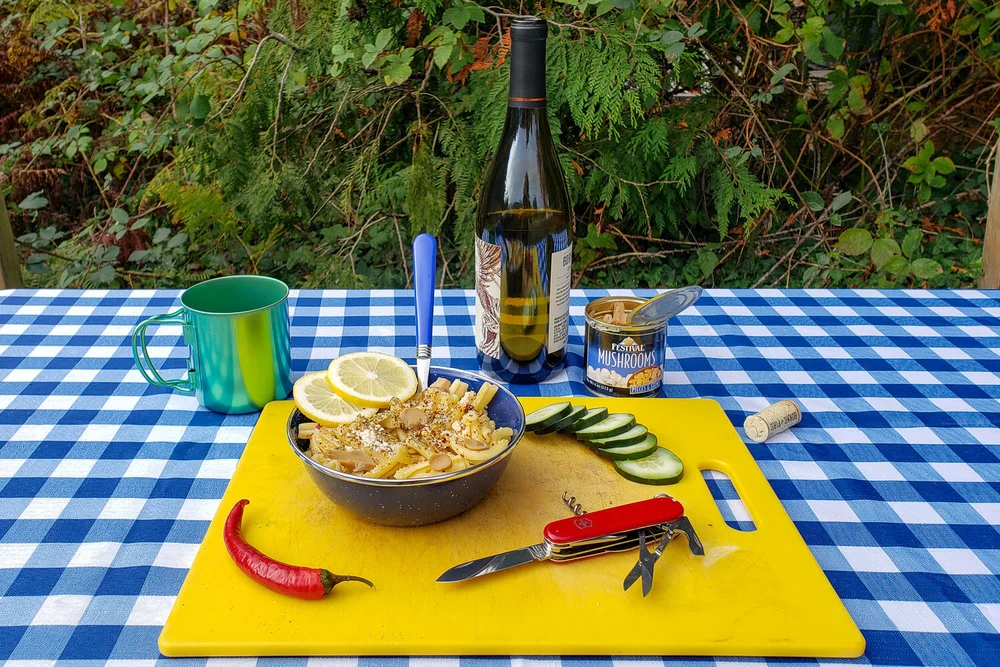
A multitool like tHE VICTORINOX SWISS ARMY HUNTSMAN can be really helpful in the camp kitchen
Dried vs. Canned vs. Fresh Foods
Camp cooking can be as simple or ornate as you want it to be. Consider your trip goals, how much you enjoy cooking, and the length of your trip to find an approach that suits the situation best.
DEHYDRATED MEALS - You can take a similar approach to backpacking and rehydrate dried meals while camping. Instant store-bought foods and packaged freeze-dried meals are lightweight/compact, very easy to purchase and prepare, and require minimal cookware. They’re also great for long trips when it would be difficult to keep food chilled in a cooler. That said, dehydrated meals can be expensive unless you make them yourself, and most people prefer to eat fresher foods while camping.

freeze-dried meals are lightweight/compact, very easy to purchase & prepare & require minimal cookware
CANNED/DRIED FOODS - If you’ll be camping near a vehicle and won’t have to carry your food far, weight and bulk isn’t as much of an issue as it is for backpacking. Canned and pre-made foods are quicker and easier to prepare than cooking from scratch. They also have a bit more flavor/ freshness than dehydrated meals.
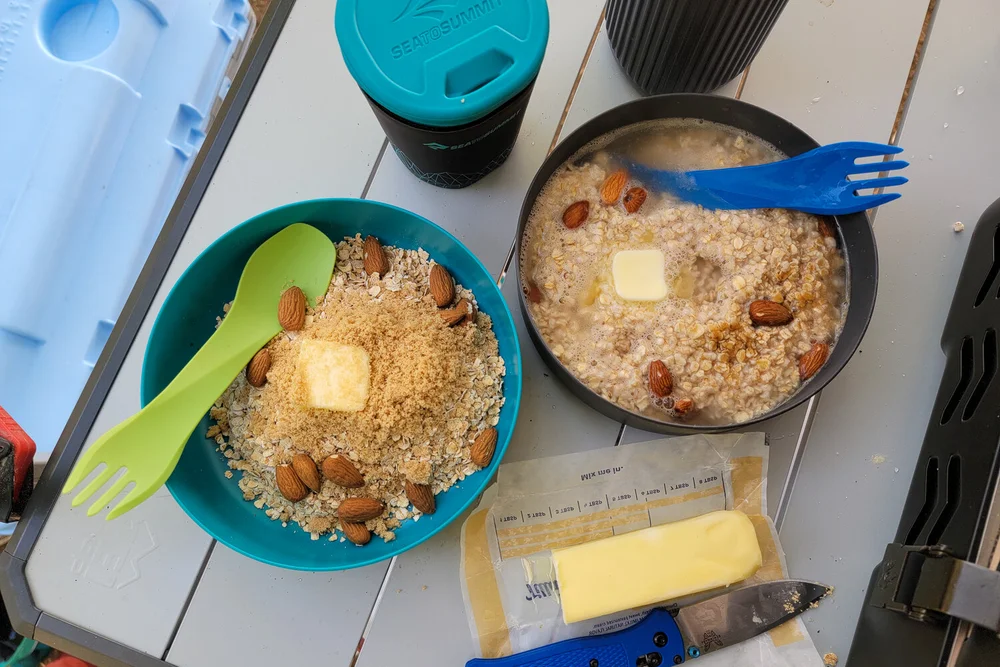
We generally prefer to use a combo of fresh foods & dried/canned goods on our camping trips
FRESH FOODS - We generally prefer to use a combo of fresh foods (meat, veggies, and fruit) and dried/canned goods (bread, chips, pasta, and beans) on our camping trips. Fresh foods are delicious, offer the best nutrition, and we enjoy spending time luxuriating around the camp kitchen. You’ll need a cooler and plenty of ice to keep fresh meat, eggs, vegetables, and dairy products chilled. We usually pack dry goods in a clear plastic bin with a lid to keep things organized and protect food from wildlife (we stash it in the car at night).

You’ll need a cooler and plenty of ice to keep fresh meat, eggs, vegetables & dairy products chilled
Creating Your Camp Kitchen
Great recipes and ingredients are at the heart of every delicious outdoor meal, but you’ll also need to be equipped with some great cookware. Here are some of our favorite camp kitchen gear picks:
Sponge / scrubber
Storage bin(s) (for food and gear)
For a complete list, check out our Ultimate Camping Checklist.

Cooking bacon & blueberry pancakes with the Jetboil Genesis Basecamp System
We hope this inspires you to get out there and make some amazing meals with your family and friends. We look forward to adding more recipes here soon. We’re always open to more ideas! Leave a comment below to tell us about your favorite camping meals. Get outdoors and bon appétit!
Some of the links on this page are affiliate links, which means we may receive a modest commission if purchases are made through those links. This adds no cost to our readers and helps us keep our site up and running. Our reputation is our most important asset, which is why we only provide completely honest and unbiased recommendations.

